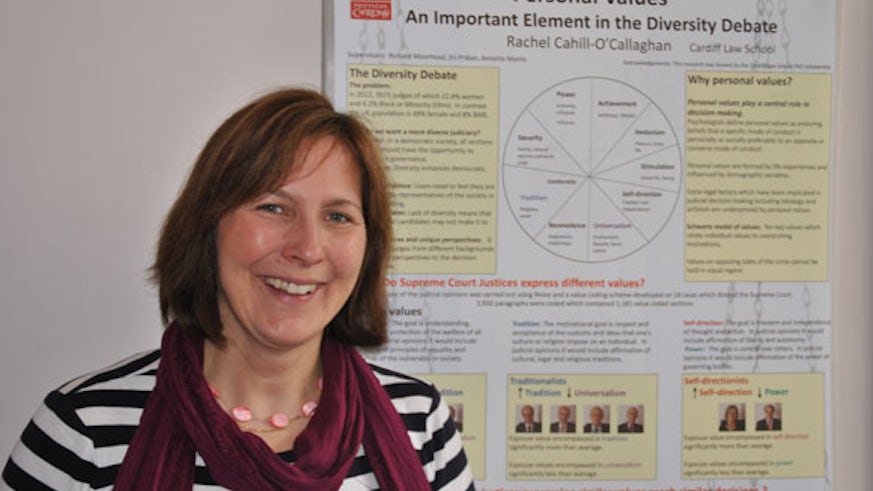2014 SLS Best Paper Prize awarded to Cardiff Law researcher
16 October 2014

We are very pleased to announce that Dr Rachel Cahill-O'Callaghan, a researcher at Cardiff School of Law and Politics, has been awarded the prestigious Best Paper Prize by the Society of Legal Scholars (SLS).
Dr Cahill-O'Callaghan’s paper, titled 'Reframing the Judicial Diversity Debate: Personal Values and Tacit Diversity' considers the influence of personal values on judicial decision making. Personal values serve as tacit influences on decision making and this paper demonstrates that despite a perceived lack of diversity characterised by demographic variables such as race, age or gender, there exists in the Supreme Court diversity of values (tacit diversity). The paper was presented in the Open section at the SLS Annual Conference in Nottingham last month and will be published in the Journal of Legal Studies early next year.
In reaction to the news of this award, Dr Cahill-O'Callaghan said:
“I am delighted to receive this award from the society. As an early career researcher it is a tremendous honour and I would like to thank the Society of Legal Scholars for recognising and supporting my research."
"I have spent my entire legal academic career at Cardiff University and I think this award reflects the positive research environment within the School of Law and Politics that encourages early career academics to pursue their research passions.”
Dr Cahill-O'Callaghan transitioned into the study of law at Cardiff in 2007, following a successful career in academic research in the area of cancer biology and bacterial genetics at Trinity College (Dublin), Massachusetts Institute of Technology (Boston) and Imperial College (London). Her work is widely published and has won several awards including the SLS Poster Prize and Socio-Legal Studies Association (SLSA) Poster Prize in 2012.
Abstract of Dr Cahill-O’Callaghan’s paper:
It has long been argued that the Judicial Committee of the House of Lords, now the UK Supreme Court, is characterised by Justices who are white and male with a public school and Oxbridge education. Despite continuous debate and reflection on the lack of diversity, by academics, government and the popular press, little has changed. These debates have centred on explicit diversity, overt characteristics that are easily codified and reflect how the judiciary are seen.
Drawing on the psychological theory of decision making, this paper argues that judicial decisions are subject to tacit influences which are not limited to overt characteristics. Personal values serve as one such tacit influence on decision making. Personal values are formed by life experiences and reflect many of the characteristics identified within the explicit diversity debates. However, personal values are influenced by more than simple demographic variables. This paper uses the example of personal values to highlight that despite the lack of explicit diversity, there is an element of tacit diversity in the Supreme Court which is reflected in judicial decisions. The impact of these findings serves to extend the debates surrounding diversity, highlighting the limitation of debates centred on explicit diversity alone.